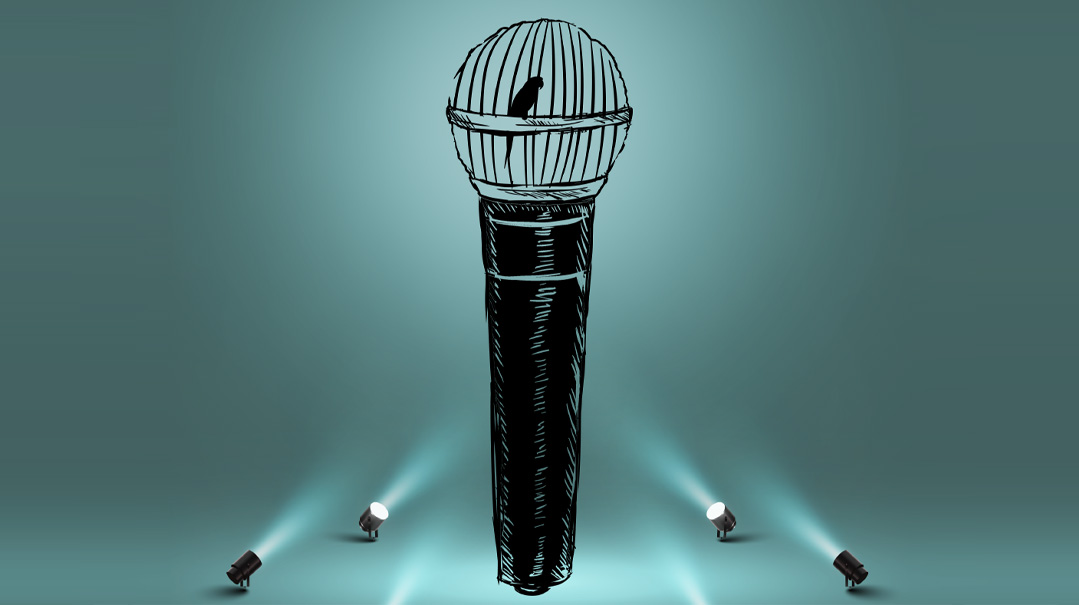Clean Homes, Clean Hearts
| August 19, 2020The summer vacationers snatched away our serenity and cleaning help

Daniella: Why can’t you accept that everything’s more expensive during the summer?
Minna: How can you enjoy a vacation at the expense of the local residents?
Daniella
The bungalow was a mess. Shani’s pajamas, Bini’s blankie, Yoni’s socks from the past week. Paper cups, leftover cereal bowls, Daniel’s Clics. Food wrappers and an overflowing garbage bag (we needed to buy a garbage can already!). Four books, three sandals in different sizes, a few pages torn out of some magazine, a melting Popsicle, a trail of broken potato chips.
I took one breath, then another. Four minutes until I had to leave for camp. Four minutes to change into a wig, put on some eyeliner and lipstick, grab some lunch (forget about breakfast). How could four minutes stretch to putting this place into some semblance of order? But what were my options? Leave it for when the kids came back? Try to cook supper surrounded by cranky children and sticky breakfast remains? I needed to do laundry.
But laundry, apparently, was not fated to happen. Like it didn’t happen yesterday. Or the day before.
I thought wistfully of Claudia, my dependable cleaning lady back home. She came every day, knew her routine, was on top of the laundry and the straightening up and the deep cleaning and the linen. I needed Claudia. I needed help. I was working full days as a day camp director, had six kids with me in the country, and my husband tended to turn up in the last few minutes before candle-lighting on Erev Shabbos.
I dashed on some lipstick, realizing too late it was the deep plum color I usually kept for Shabbos. My eyeliner smudged, no time to deal with it, forget it.
I jammed on my fall, a band, and slammed the door shut on the mess. For the next few hours, I had enough to focus on. And tonight, I’d figure something out about the cleaning situation. One thing was clear: It couldn’t continue this way.
I was flipping burgers on the grill when I noticed a short woman in overalls leaving the bungalow next door. For a moment, I just stared. A cleaning lady: It was like some sort of mirage in the desert. Now how could I get her number?
When the kids were in bed, I turned off my phone because it just wouldn’t stop ringing, and knocked on the neighbours’ bungalow. I knew the woman vaguely, her name was Chumy something, she sent her kids to my camp. Arons, maybe?
She greeted me brightly. She was an old-timer in this part of the mountains, I was new this summer, but most people knew me as the day camp’s new director. I’d run camp programs for years, but this was the biggest one, and the most work. I was still getting to know the staff and the kids, not to mention the campgrounds, and I was on my feet from beginning to end of the day. Some of my kids were in my camp, the boys went off on the bus to their own day camp each morning, and I had a mother’s helper for Bini. But we all arrived back home around the same time, and by the time we were done with supper, showers, and bedtime — I was beyond drained. And of course, that’s when my phone went into frantic mode.
I needed a cleaning lady. I needed a cleaning lady. We were talking sanity here.
I was a little embarrassed to ask Chumy for her cleaner’s contact information, but she was happy to give me a few numbers.
“I have a rotation of a few different ones,” she explained. “If you call around, one of them might have spare slots. Make sure you offer a good price,” she added, her tone of voice significant.
I hadn’t thought about prices. “How much do you mean?”
Chumy leaned forward, adjusted her headscarf. “Like, it’s insane, but mine takes 30 dollars an hour. That’s the summer rate, everyone’s desperate for help, what can you do?”
“Thirty?” I was taken aback. But hey, I was going to literally fall apart if I didn’t do something about the situation. “Well, I guess it is what it is. Thanks a million for your help,” I told Chumy.
Then I headed back to my bungalow to switch my phone on. There were six voicemails and a bunch of text messages, but first things first: Before I returned a single one, I was going to find a cleaning lady.
Joanna had an hour available, three times a week. The timing wasn’t great — late afternoon, just when everyone was coming home from camp — but I’d make it work, I’d have to.
And boy, was the minor inconvenience worth it! It took a few days, but Joanna soon figured out my laundry system, the kids’ bedrooms, the kitchen. She knew all about meat and milk, of course, since she worked for many other families. Having the help was a real game-changer, especially on Friday afternoon. When Avi drove up, exhausted, after a week in the city, he came into a clean and organized bungalow. I was relaxed, the kids were happy and tanned, and things were running smoothly. Like I said, undoubtedly worth the price.
“Cleaning lady working out?” Chumy asked me one day. She gestured in the direction of Joanna, who had just left.
“Thank goodness, yes,” I told her fervently. “I really appreciate your help, by the way. I literally don’t think I could’ve done another day without this.”
She smiled and waved a hand. “My pleasure.”
I was back in the bungalow, throwing together a salad for supper, when there was a quick knock at the door. One of the neighbors? “Door’s open!” I called out.
An unfamiliar woman stood in the doorway. She was wearing a short, stiff brown sheitel and my hands flew to my snood, which was slipping again. Surely she wasn’t one of the bungalow women? I thought I knew their faces by now. Maybe a new arrival from the city? That could explain why she was dressed so formal.
“Hi?” I let a question into my tone.
The woman didn’t respond to the greeting. She gave a quick glance around the bungalow, and then blurted out, “Does Joanna come to you? The cleaning lady? I saw her leaving earlier…”
Oh. I gave her a knowing smile. “Yes, she’s great. You want her number? She might have a spare slot or two…” I trailed off. “Wait, you know her already?”
The woman’s lips tightened. “Do I know her?” she asked frostily. “Of course I know her. She’s my cleaning lady, came to me three times a week. Until the summer, when she takes two months off to go to other people.”
I stared at her, pieces clicking into place. The formal dress, everything screaming non-vacation… of course, she must be one of the locals. Part of the small frum community that lives in the country year-round. I felt bad for her that her cleaner leaves for the summer, but —
“But why does she do that, if she has a steady job?” I was nonplussed. “I mean, is this standard?”
“Well, I presume you offered her more than 15 dollars an hour, right?”
Fifteen dollars?
“You bet I do. I was told that 30 is the standard rate. Personally, I think it’s crazy, but that’s what they said…”
“They.” The woman let the word drop, disdainfully. “ ‘They’ is all of you, vacationers, you know? Coming up here and hiring away our cleaning help, offering them double the wages to give up their regular jobs and leave us stranded… you know how difficult it is? Every summer. Random weekends. Yom Tov time… whenever the bungalow families arrive, the cleaning help simply disappears on us.”
Oy, that’s terrible. I couldn’t imagine — well actually I could imagine — what it was like to function without your regular help. But then again, how would it help this woman if I let Joanna go? She would just find another vacationer willing to pay the higher rate; no way would she go back to this woman who only paid 15 dollars per hour.
Maybe you should offer her the same rate as we do, I thought, but I didn’t dare to suggest it.
As soon as the woman left, though, I made a note to book in on another cleaning lady’s rotation. If Joanna would decide to leave for some reason, I needed a back-up plan.
Lottie was tiny and talked more than she cleaned, but she was willing to take on two days a week, and it was better than nothing. I was surprised at the problems the locals were complaining about; the cleaning ladies seemed remarkably eager to take on more slots. It wasn’t like there weren’t enough of them. It was simply a matter of paying the going rate.
I mentioned it to Chumy next time we were chatting. She told me it was a sore point.
“It’s like this ongoing battle, locals versus vacationers,” she said. “Honestly, I don’t think they have a right to complain. It’s not like it’s all loss for them. Everyone knows that without the summer vacationers, a lot of this area wouldn’t make it through the winter. We do a service to the community, the local stores get more parnassah in these two months than they do the entire year, a lot of us give donations to the mosdos around here too. So the price of cleaning help rises, big deal. We bring some income, and some costs. That’s just how it is.”
I was keeping an eye on Bini as she ran around barefoot. “Uh-huh,” I said, vaguely.
“I mean, we need our cleaning help, too, right?” Chumy smiled at me winningly. “I could never give up mine, that’s for sure.”
“No way,” I agreed fervently. I thought of my life in the mountains, pre-Joanna. What a nightmare.
“Besides, they’re so confrontational about it, not easy to work with,” Chumy continued. “If there’s a real issue, we could work together, meet halfway. Agree to set a standard summer price or whatever. Give them first choice of the hours, I don’t know. But they’re not willing to meet in the middle.”
She paused for breath, and I thought of the woman who’d accused me of stealing her cleaning help. All I’d done was called up the number on the list and asked if she had available hours.
“Mommmyyyy,” came a familiar wail. Bini must have tripped or something. I shaded my eyes; there she was, further down the path.
“Can’t win them all, I guess,” I said easily, and went to rescue Bini.
If I could tell Minna one thing, it would be: Why can’t you accept that everything’s more expensive during the summer?
Minna
It gets worse every summer.
I say it every year, and I wonder if it’s true or if I’d just forgotten what it was like — but really, really, some things are just the limit.
We live in the Catskills, that golden zone of summer-land that multiplies in population for two months a year. Year-round, we’re a small community, close-knit, quiet. A few stores, fresh air, lower standards of materialism, lots of empty space for the kids to run around. And then summer comes, and so do the vacationers.
They waltz in and suddenly, our town is no longer ours. There’s noise and music, day camps and pop-up stores, there’s late-night hours in the grocery and lines down the block outside our local pizza place. There are people, people, people, New York fashion and teens hanging out till three a.m.
I used to enjoy the experience, seeing our little town transform into a hub of activity, but the novelty wore off fast. It’s not just the surge in population, the overcrowding, the feeling that you don’t quite belong in your own home. There’s also the other issues, the stores running out of stuff unexpectedly, the traffic that can’t seem to slow down to a normal speed for our usually child-friendly streets, and of course, there’s the cleaning help.
“It’s not normal,” I complained to Shimshy. “The cleaning ladies, all of them, they just disappear. They take off the entire summer — and not for vacation! They go to the bungalows, where the women sit with their manicured nails and chill by the grill…”
“…And pay them double what any of us could afford,” My husband completed the sentence, tiredly. He’d heard it all before. “I know, Minna, I know. It’s not fun.”
I kicked at a toy car, then regretted it, and bent to pick it up. “It’s not just about fun, it’s about coping! I can’t manage this, I have my job, the kids are on vacation, I can’t have Joanna upping and leaving for two months a year!” I gestured to the kitchen, dirty dishes overflowing the sinks. “And it doesn’t end here. Last year, Joanna kept taking weekends off. I thought she was going away or something, till I realized what was going on. Every time one of her summer families came up for a Shabbos in the bungalow, she’d take off Fridays to go work for them!”
Shimshy clucked in sympathy. “Want me to do the dishes?” he offered. He peeked into the kitchen. “Uh, or make a start…”
I looked at my watch. He had less than five minutes until his chavrusa. “Nah, forget it,” I said.
The grocery was a madhouse. I searched the aisles as I tossed ketchup and a bag of French fries into my cart. So many people, women and kids and teenagers in camp sweatshirts. Not one, single, familiar face. Welcome back, summer.
I navigated to the checkout. There were three counters open, where we usually managed with a single checkout clerk. Still, the lines looked at least half an hour long.
“Minna?”
I half-turned. “Shayna! Good to see you.”
All around us, there was a babble of noise and conversation. I guess the bungalow people know each other. It was so weird to feel like the stranger one block away from my house, and I was relieved to see a friendly face.
Shayna maneuvered her cart alongside mine. “Doesn’t feel like our good old grocery, huh?”
We shared wry smiles. My head was pounding.
“I’m going to try my luck on the next line,” she said, pointing. I nodded and waved. Well, she seemed cheerful enough, maybe I should stop the pity party and just deal with it. This was summer life in the country.
But later that evening, Shayna called, and all the cheer was gone from her voice.
“Minna, my cleaning lady — the one who’s been coming to me every Thursday since forever? She’s just backed out on me for the next two months.”
I could hear the anger in her voice — and the desperation. Shayna had five little kids, including toddler twins. She held down a job; her husband, like mine, was in kollel throughout the year, and worked as a day camp rebbi in the summer. They had no money to spare, and her once-weekly cleaning lady was the only luxury — and lifeline — that she allowed herself.
“Oh, no,” I managed. “What’s the story? She’s on vacation?”
But I knew the story already.
“No,” Shayna said, bitterly. “She got offered a raise. Some vacationer stopped her on the street, asked her to come full days on Thursdays, and offered her more than double what I pay. She cancelled on me and Chaya, she’ll be back in September.”
“Welcome to the club,” I muttered. Then I regretted it. Shayna worked so hard, she ran herself ragged to manage with the minimum, and no one knew better than I that she couldn’t afford to offer any more money. “Ugh, that’s horrible, Shay, I don’t even know what to say. My cleaning help has abandoned me too.”
My friend was near tears. “But Minna, I literally can’t handle this, I need the help. I have no idea how I’ll get to Shabbos without it.”
“I wish I could help,” I said. “My Libby’s in camp, otherwise I’d send her over…”
Shayna sighed deeply. “I guess I’ll just have to live in a dump for two months. What should I do?”
I murmured in sympathy, but what could any of us do? Was there anything to do?
We had to try something. I approached one of the women in the colony down the street after I saw Joanna leaving her bungalow one afternoon, tried to speak to her about the situation. But she didn’t seem to hear. And why should she — she had her life under control. Neat rotation of cleaners, perfect bungalow, easy life. Why should she give it up?
“We have to do something,” I announced one afternoon. Chaya, Suri, and I were in Shayna’s house — I’d organized the meeting, and she’d begged to host it — “That way, I can wash my dishes while we talk.”
I picked up a broom to sweep the floor while I spoke. We were easy like that — four friends, all neighbors, husbands in the same kollel, and we’d known each other for ten years, which felt like forever. “Listen, the bungalow women, they don’t have a right to do this to us. I think we should speak to a rav, explain the situation. Maybe we can take them to a din Torah or something?”
Suri sighed. “I don’t know if it’s so simple,” she said. “I mean, of course we can try. But how can we force them to give up the cleaning help? They’re not going to just say ‘gosh, sorry, you’re right, we shouldn’t have done that, take your cleaning lady back’ — and besides, who are we taking to a din Torah? All of them? One of them? Which one?”
She was being practical, but then again, Suri was one of the few lucky ones. She had a daily cleaning lady, two hours every morning, who was loyal enough not to drop those hours in the summer.
“There’s another problem,” Chaya added, glumly. “And that’s the cleaning ladies themselves. They’re the ones gaining the most out of this. Why should they want to go back to their regular wages when they know they could be getting double over in the colonies?”
I finished sweeping the floor, and starting pacing instead. “But this is ridiculous! We’re supposed to just give in each summer, each weekend, every Yom Tov… or else raise our own pay to something that’s way more than we can afford? How can that be okay? Why shouldn’t we do something? We’re hosting the summer vacationers in our town, can’t there be some sort of rules about this?”
Shayna chimed in from over by the sink. “I asked my husband. He says it’s a bit complicated. But maybe if everyone in the town got involved…”
“I dunno, I think we can ask people to just be decent,” I said. “Set a standard rate for cleaning help and ask people not to go above that.” But even as I said it, I knew that wasn’t going to work. “Forget it,” I said, defeated. “They’re not going to listen.” I thought of the woman I’d tried to approach, her perfect makeup and chilled nonchalance as she puttered around a sparkling bungalow kitchen. “They want the cleaning ladies, and they’re going to keep bribing their way onto their rotations. There’s nothing we can do.”
With our failed campaign meeting on my brain, I started seeing them everywhere. The cleaning ladies. The bungalows. The cleaning ladies leaving the bungalows, wads of cash in hand. Okay, I didn’t see the wads of cash, but they were obviously there.
Every so often, I’d see an unfamiliar woman approach one of the cleaning ladies, pull out her phone. They’d talk, exchange numbers, and then and there I knew one or another of our local community members had just lost her weekly help.
I wondered if I should speak up, say something, let them know how we felt. It was so hopeless but so hard to hold back.
And then, finally, interminably, August was drawing to a close.
It had been forever since my house had had a normal, thorough, deep-clean. I dialled Joanna one evening, but there was no answer. Ugh, she was probably cleaning someone’s bungalow.
I finally got through, on the second evening.
“Hi, Joanna, it’s Minna, how was your summer?” I tried to be polite. I needed her help, after all.
“Yah, great, Mrs. L., and yours?” She sounded guileless.
“Yes, good, thanks.” I paused, tried for a light note. “So, when do you think you’ll be back? We miss you here!”
The phone went quiet.
“Joanna? You hear me?”
“Hi, yes, sure, I’m here,” my cleaning lady said. “Thing is… I’m not sure.”
“Not sure? What, when you’ll be able to come back?”
“No, no, it’s not that.” Something shuffled in the background. “I can come back next week if you want. But it’s like this, about paying me… I’ll be charging 20 dollars an hour from now on.”
My mouth dropped open. “Twenty?” I stammered. What was this, a conspiracy? Were all the cleaning ladies in the town going to demand more? But this was ridiculous, we didn’t have to allow it, we could band together as a community and refuse to back down. Summer rates were one thing, but was there really so much need for cleaning help throughout the year that the cleaning ladies could make demands like that?
Or maybe they simply realized how desperate we were to have them back.
“Twenty an hour, it’s not just you, Mrs. L., I’m telling everyone.” Joanna cracked some gum. The sound echoed in my ears even after we concluded the conversation and I hung up the phone, stunned.
So it wasn’t just the summers getting worse. Everything was spiraling out of control, because of the selfishness of the vacationers who come once a year and expect to be pampered hand and foot.
How was this supposed to continue?
If I could tell Daniella one thing, it would be: How can you enjoy a vacation at the expense of the local residents, and make things increasingly difficult for us all year round?
(Originally featured in Mishpacha, Issue 824)
Oops! We could not locate your form.







Comments (5)